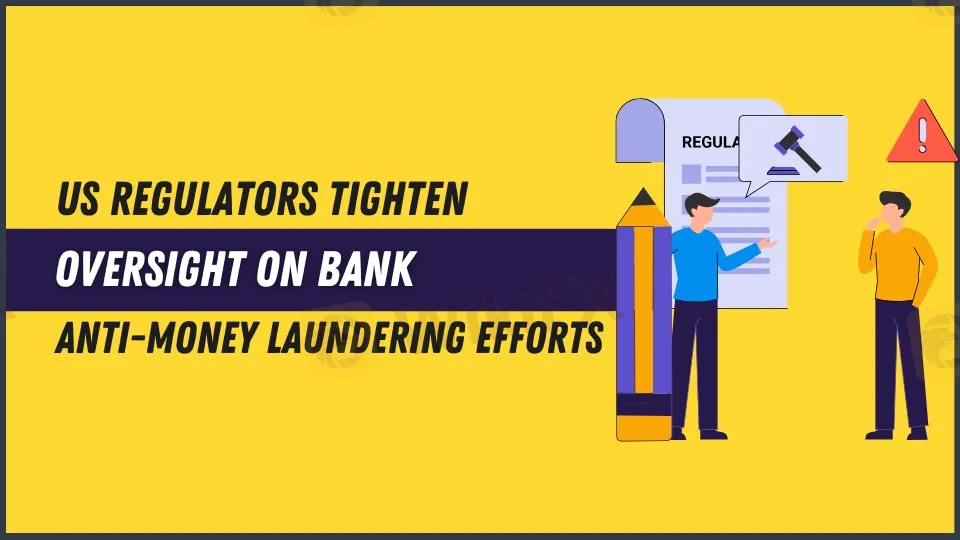简体中文
繁體中文
English
Pусский
日本語
ภาษาไทย
Tiếng Việt
Bahasa Indonesia
Español
हिन्दी
Filippiiniläinen
Français
Deutsch
Português
Türkçe
한국어
العربية
US Regulators Tighten Oversight on Bank Anti-Money Laundering Efforts
Abstract:US regulators warn banks of stricter enforcement on money laundering rules, highlighting recent penalties against major lenders like TD Bank.

U.S. regulators have issued a stern warning to banks regarding increased scrutiny over financial crime prevention efforts. The message is clear: the government will not ease its focus on combating money laundering and enforcing strict know-your-customer (KYC) regulations.
This warning comes as U.S. financial authorities ramp up enforcement after a series of high-profile failures in the banking sector. Banks are facing heightened regulatory pressure, especially on their risk management practices and anti-money laundering (AML) programs. Recent actions indicate that regulators are more willing to impose penalties for non-compliance.
A significant example is TD Bank, which was slapped with a record $3 billion fine last month for violating U.S. laws designed to curb money laundering. The fine, which stems from the banks failure to detect and prevent illicit transactions, highlights the growing importance of effective AML monitoring systems. In response to these deficiencies, TD Bank agreed to a rare asset cap, restricting its future expansion efforts in the U.S.

This trend of intensified scrutiny is not limited to TD. Wells Fargo also found itself in the crosshairs of regulators in September after the Office of the Comptroller of the Currency (OCC) discovered weaknesses in the bank‘s safeguards against money laundering and other illegal activities. The OCC subsequently imposed restrictions on Wells Fargo’s ability to enter high-risk business areas.
Additionally, Bank of America faces potential regulatory actions due to concerns over its AML controls and its failure to adequately detect sanctions evasions and other financial crimes.
Greg Coleman, the senior deputy comptroller for large banks at the OCC, emphasized that these issues must be addressed quickly, as lapses in financial crime prevention pose serious risks not only to individual institutions but to the financial system as a whole.
With growing concern over global financial stability and security, U.S. regulators are likely to continue tightening their approach toward anti-money laundering measures. Banks are advised to review and strengthen their internal practices to ensure compliance with increasingly strict regulations.
Final Thoughts
As financial institutions face mounting regulatory pressure, the message is clear: no bank is immune from scrutiny. With penalties growing more severe and enforcement actions ramping up, banks must invest in stronger AML practices and compliance measures to avoid costly mistakes and protect their operations from future regulatory risks. The heightened focus on financial crime is likely to persist, making vigilance a top priority for banking executives moving forward.

Disclaimer:
The views in this article only represent the author's personal views, and do not constitute investment advice on this platform. This platform does not guarantee the accuracy, completeness and timeliness of the information in the article, and will not be liable for any loss caused by the use of or reliance on the information in the article.
Read more

Why Hasn’t Binance Listed Pi Network (PI) Yet? Key Reasons Explained
Why hasn’t Binance listed Pi Network (PI)? Discover the key reasons, including mainnet restrictions, regulatory concerns, and what needs to happen for a future listing.

Famous Olympic Breakdancer’s Brother Faces Crypto Fraud Charges
Australian Olympic breakdancer Rachel "Raygun" Gunn’s brother, Brendan Gunn, accused of crypto fraud involving $181,000. ASIC investigates.

Beware of CySEC Scam: Fraudsters Impersonating Officials
CySEC warns investors of scams involving fraudsters impersonating officials and using fake websites to deceive traders. Learn how to stay safe from investment fraud.

401 Foreign Nationals Arrested in Pasay City POGO Raid
401 foreign nationals were arrested in a Pasay City POGO raid for illicit activities, including scams. Authorities crack down on illegal offshore gaming operators.
WikiFX Broker
Latest News
Is TUOTENDA a cryptocurrency scam primarily targeting men over the age of 50?
Canada to Enforce Retaliatory Tariffs if U.S. Duties Persist
Unbelievable! Is the Yen Really Gaining Strength?
$13M Pig Butchering Scam: Three Arrested for Money Laundering
FINMA Opens Bankruptcy Proceedings
FCA Issues Warning Against 14 Unregistered Financial Firms
Crypto Scam Exposed: 3 Arrested for Defrauding Investors
Nifty 50 Index Futures Now Available at Interactive Brokers
Grand Unveiling: The Core Reasons Behind the Yen’s Rise
Ethereum’s Shock Drop: What’s The Real Reason?
Currency Calculator







